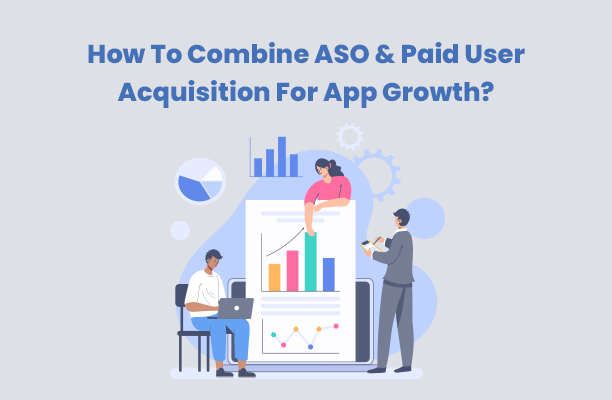For businesses, it has become essential to have a mobile app to reach out and engage with their customers. However, designing and developing a mobile app is only the first step – businesses need to think about launching a mobile app campaign to get people to download their app.
Two key ways to acquire users for your app are – paid user acquisition (through ads) and organic user acquisition (through ASO).
Paid UA is the process of placing your app in front of potential users through paid channels like ad networks, social media, or even directly on app stores. Google app campaign or Universal App Campaign(UAC) is the perfect example of paid user acquisition channel for your app.
On the other hand, Organic UA is optimizing your app store listing to rank highly in search results on the app store without having to pay for the placement. It’s done by optimizing your app store page, as well as your app’s listing on other sites and directories.
Combining paid and organic UA strategies can get the best results. Optimizing your app for search and using paid UA to reach new users can effectively grow your app’s user base.
Tips for combining ASO & Paid User Acquisition for app growth:
Follow the ASO tips below to make your app more discoverable in search results, and use paid UA to reach new potential users on high-difficulty keywords over competitive channels.
-
Start with App Store Optimization:
Before you start your paid User Acquisition campaign, you must ensure that your app is optimized for search. It means optimizing your app store page to rank highly for relevant keywords.
You can use keyword research tools like AppTweak or Sensor Tower to find the right keywords to target. Once you’ve identified the right keywords, you can start optimizing your app store page.
Ensure your app’s name and icon are attention-grabbing and relevant to your app’s function. Your app’s description is also essential – use the right keywords throughout the text, and make sure to include a compelling call-to-action. You should also use screenshots and videos to show the key features of your app.
-
Level up with your Google Universal App Campaign:
Paid UA is a great way to reach new potential users for your app. Google UAC is one of the most effective paid UA platforms, as it allows you to place your app in front of potential users who are already searching for an app like yours.
Create a campaign on the Google Ads platform to start with the Google Universal App Campaign (UAC). You’ll be able to choose your budget and target keywords.
Use the right keywords to show your ad to potential users interested in your app. You can also use other paid UA platforms like Facebook Ads or Apple Search Ads. Experiment with different platforms and see what works best for your app.
-
Focus on comparative analysis:
While focusing on a universal app campaign, track ASO keywords for comparative analysis. Doing so will help you understand which UA strategies are working and which need improvement.
Be data-driven and use the insights you gain from your research to improve your UA campaigns. Compare your channels to see where you’re getting the most downloads, and adjust your budget accordingly.
You can also use data from your ASO efforts to improve your paid UA campaigns. For example, if you see that specific keywords are driving a lot of organic traffic to your app store page, you can target those keywords with your paid UA campaigns.
Moreover, check what copywriting or creatives are working better for your app and use those insights to improve your paid UA ads.
It’s important to note that you should never rely on one UA strategy to grow your app. While paid UA can be effective, it should always be combined with other organic growth strategies.
-
Cut down what doesn’t work in your marketing strategy:
After you have analyzed what’s working and what isn’t, cut down the strategies that aren’t giving you the desired results. It will help you save money and focus your efforts on the working methods.
For example, if your Facebook Ads campaign isn’t yielding many downloads, you can adjust your targeting or creativity. Alternatively, you can stop the campaign and focus your budget on other paid UA platforms. The key is to be data-driven and constantly experiment until you find the right combination of UA strategies that work for your app.
-
Analyze results and improvise:
Once you’ve implemented your ASO and paid UA campaigns, tracking your app’s performance and analyzing the results is essential. It will help you understand what’s working and what isn’t and make necessary changes to improve your campaigns.
Whether performing A/B testing, using different creatives, or trying out new keywords, tracking your app’s progress and making changes accordingly is essential.
Moreover, it would help if you also track your app’s conversion rate – the number of users who download your app after seeing your ad.
It will help you understand the effectiveness of your campaigns and make necessary changes to improve your conversion rate.
Conclusion!
ASO and paid UA are both great ways to grow your app. However, using them together is essential to get the best results.
Use ASO to improve your app store visibility and ensure your app is visible to potential users searching for apps like yours. Use paid UA to reach new potential users who might not be aware of your app.
Author Bio: I’m Akash Yadav, an experienced Digital Marketer, and Strategist, been in the IT Industry for the last 5+ Years. Currently working with AppBroda Tech – a mobile advertising platform that helps app publishers and developers reap and optimize ad revenue. Skilled in constructing a Digital Strategy, Growth Hacking, etc.

